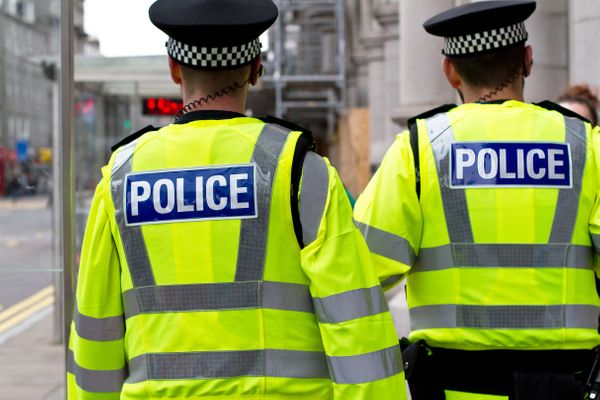2.2.2
Repression, 1933-1945
The Courts
The Courts
Under Hitler's dictatorship, the courts were manipulated to favour the Nazi regime.


Oath of loyalty
Oath of loyalty
- Existing judges had to take an oath of loyalty to Hitler. Under a new penal code their decisions must reflect the will of the people. They could be replaced.


New courts
New courts
- New People’s courts and special courts were set up alongside traditional courts.
- So judges who went against the government’s wishes were easily bypassed.


Agencies outside the law
Agencies outside the law
- New specialist agencies were given their own powers to enforce policies.
- The Gestapo and SS operated outside the legal system.


Punishments
Punishments
- Punishments were arbitrary and there was no right of appeal in some courts.
Instruments of the Police
Instruments of the Police
Instruments of the police were vital for maintaining control over Germany.


The police
The police
- Ordnungspolizei: (Orpo) conventional, municipal uniformed police.
- Kriminalpolizei: (Kripo) plain clothes police investigating ordinary crimes.
- 1936: all Länder police forces were unified into a national force under Himmler, who was answerable only to Hitler.
- A new division, Sipo (Security Police) combined the Kriminalpolizei and Gestapo.
- Reinhard Heydrich oversaw it and answered to Himmler.


The SS
The SS
- The SS was the main instrument of terror, with a wide a range of roles. By 1939, the SS had 240,000 members across various organisations.
- Waffen SS (elite military units) grew to rival the Wehrmacht.
- Death’s Head Units ran concentration camps and Panzers (tank) units.
- SS-WVHA (economic branch) ran over 150 firms.
- The SS organised extermination camps and controlled much of Germany’s conquered territories in World War Two.


The Gestapo
The Gestapo
- The Gestapo investigated crimes against the Third Reich including treason, spying, sabotage, and sent thousands to concentration camps without trial (‘protective custody’).
- It acted against Jews, left-wingers, trades unionists, homosexuals, undesirables, critics of the regime. As racial legislation developed, the Gestapo’s role grew.
- Its agents infiltrated suspected opposition groups and monitored non-conforming individuals but also relied heavily on informants and denunciations.


The SD
The SD
- The SD was the internal security or secret service, considered an elite. The SD was responsible for the security of the Third Reich.
- The SD focused on information gathering. It investigated and rooted out enemies (real or potential) of the Third Reich. There was no right of appeal.
- The SD reported on public opinion and could investigate or monitor anyone it suspected of being an ‘enemy of the state.’ It had an extensive network of informants.
- Reinhard Heydrich, and therefore Himmler oversaw the SD.
,h_400,q_80,w_640.jpg)
,h_400,q_80,w_640.jpg)
Assessment of instruments of police
Assessment of instruments of police
- Sax (1992) on the SS:
- ‘The SS was not merely a police, surveillance, and paramilitary organisation. Its main objective…was to make great the racially pure Volksgemeinshcaft.’
- Best (chief legal advisor to the Gestapo) on the Gestapo:
- ‘As long as the “police” [Gestapo] carries out the will of the leadership, it is acting legally.’
- Himmler on the SD:
- 'The SD will discover the enemies of [National Socialism] and it will initiate counter-measures through the official police authorities.'


Historical assessment
Historical assessment
- Historian Robert Gellately (2001) has sampled Gestapo case files from three different regions in Germany. He found that 73% of cases concerning listening to foreign radio (an illegal activity) originated with reports from the population.
- People's reasons for denouncing were rarely affective (based in a belief in National Socialism or Hitler) and were more often instrumental (for personal gain and reward).
- One woman informed on her sister's husband because he was abusive.
- One girl denounced her brother for listening to foreign radio because he was pigheaded.
Extent of Totalitarianism
Extent of Totalitarianism
The traditional view of Nazi Germany was that it was a totalitarian state supported by terror. Recently historians have argued that there were more people supporting, or cooperating with, the regime than previously thought.


Totalitarian
Totalitarian
- It was a one-party state with one Führer who was both president, chancellor and, from 1938, commander of all armed forces.
- The state controlled the forces of repression, censorship and propaganda.
- Gleichschaltung: Nazi influence was present in almost every aspect of daily life and society e.g. school curriculum, KdF, DAF, youth movements.


No real opposition
No real opposition
- In any totalitarian state there are elements of opposition. The issue is how effectively it was dealt with. Instances of opposition were isolated and low key.
- Resistance to the Nazi regime was very limited as most Germans supported it, or at least took no action against it. How completely these people believed in Nazism cannot be measured.
- People’s courts and directing judges to rule according to the ‘will of the people’ sidelined opposition.


Not totally totalitarian
Not totally totalitarian
- Historians argue the Gestapo was much weaker than previously thought, more reliant on its reputation and co-operation from the German people.
- Mallman and Paul (1994):
- ‘Although the Nazi regime’s aspirations were totalitarian, the reality was not.’
- Evidence of Gestapo activities shows it often relied upon denunciations the German people as it did not have sufficient staff.
- At most there were 30,000 Gestapo officers for 65,000,000 people.


Small scale opposition
Small scale opposition
- Political:
- The Gestapo’s own reports say that KPD and SPD propaganda was having an effect from 1936 after tactics were changed.
- Youth movements:
- Edelweiss Pirates and Swing groups
- Religion:
- The Confessional Church broke away from the Reich Church.
- The Catholic Church openly criticised the Nazi Regime (1937 papal encyclical).
- Euthanasia programmes were kept secret due to concerns about public opinion.
- The military: -Until the dismissal of over 100 generals in 1938 Hitler was very wary of the army.


Historical assessment
Historical assessment
- Over the course of the war, small scale opposition and grumbling became more common in Nazi Germany.
- Historian Nicholas Stargardt (2011) argues that Soldiers' letters show that there was a shift in their emotional investment at the end of the war.
- They were no longer fighting for the Fuhrer and for National Socialism but were fuelled by images of their family and their future.
- For German people the 'existential threat turned the focus both inwards and outwards, entwining the 'apolitical' promise of future domesticity with the need to hold the line.'
1Political & Governmental Change, 1918-1989
1.1Creation & Collapse of Weimar, 1918-1932
1.2Nazi Dictatorship, 1933-1945
1.3Return to Democratic Government, 1945-1989
2Opposition, Control & Consent 1918-1989
2.1Opposition to Government, 1918-1989
2.2Controlling the People, 1918-1989
3Economic Developments & Policies, 1918-1989
3.1Reacting to Economic Challenges, 1918-1932
3.2Controlling the Economy, 1933-1945
3.3Creating the Social Market Economy, 1945-1989
4Aspects of Life, 1918-1989
4.1Attitudes Towards Women, 1918-1989
4.2Education & Cultural Developments, 1918-1989
5Historical Interpretations
5.1Influence of German History
5.2Hitler & Foreign Policy
5.3Contribution of Other Nations to WW2
5.4Reasons for Invading Poland
Jump to other topics
1Political & Governmental Change, 1918-1989
1.1Creation & Collapse of Weimar, 1918-1932
1.2Nazi Dictatorship, 1933-1945
1.3Return to Democratic Government, 1945-1989
2Opposition, Control & Consent 1918-1989
2.1Opposition to Government, 1918-1989
2.2Controlling the People, 1918-1989
3Economic Developments & Policies, 1918-1989
3.1Reacting to Economic Challenges, 1918-1932
3.2Controlling the Economy, 1933-1945
3.3Creating the Social Market Economy, 1945-1989
4Aspects of Life, 1918-1989
4.1Attitudes Towards Women, 1918-1989
4.2Education & Cultural Developments, 1918-1989
5Historical Interpretations
5.1Influence of German History
5.2Hitler & Foreign Policy
5.3Contribution of Other Nations to WW2
5.4Reasons for Invading Poland
Unlock your full potential with Seneca Premium
Unlimited access to 10,000+ open-ended exam questions
Mini-mock exams based on your study history
Unlock 800+ premium courses & e-books